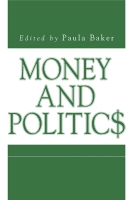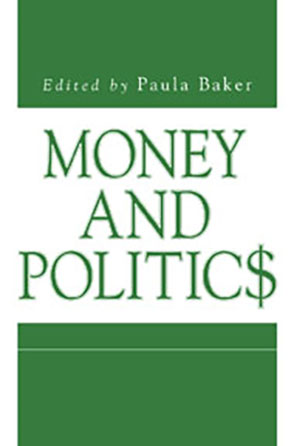Money and Politics
Edited by Paula Baker
“Money and Politics makes a unique and significant contribution to the literature concerning the history of U. S. campaign finance.”
- Description
- Reviews
- Bio
- Table of Contents
- Sample Chapters
- Subjects
This collection of original essays is a step in that direction. The chapters cover episodes from the early nineteenth century through the 1970s. They illustrate how deep concern about money in politics runs—and how the definition of the problem has changed over time. Through the nineteenth century, the "spoils system" in which party loyalists gained reward for their efforts appeared to be the evil that blocked responsive parties and honest public administration. Party war chests that brought howls of complaint (and great exaggeration) seemed quaint by the middle of the twentieth century. In part because reform had weakened the parties and campaigns required consultants' skills in coordination and in part because television advertising was so expensive, the cost of campaigns rose. Candidates griped and policy entrepreneurs worked out possible solutions, which were in place before the Watergate scandal focused public attention on campaign finance. In the history of campaign-finance reform, one generation's solutions have tended to become another's problem. Contributors to the volume are Paula Baker, Robert Mutch, Mark Wahlgren Summers, and Julian E. Zelizer.
“Money and Politics makes a unique and significant contribution to the literature concerning the history of U. S. campaign finance.”
Paula Baker is Associate Professor of History at the University of Pittsburgh. She is the author of Moral Frameworks of Public Life (1991).
Contents
Editor’s Preface
Introduction: Does Money Buy Policy?
Paula Baker
1. Campaigns and Potato Chips; Or Some Causes and Consequences of Political Spending
PAULA BAKER
2. The First Federal Campaign Finance Bills
ROBERT E. MUTCH
3. "To Make the Wheels Revolve We Must Have Grease": Barrel Politics in the Gilded Age
MARK WAHLGREN SUMMERS
4. Seeds of Cynicism: The Struggle over Campaign Finance, 1956–1974
JULIAN E. ZELIZER
Contributors
PAULA BAKER
Introduction: Does Money Buy Policy?
Money in politics is a funny thing. By legend and cliché, money is the “mother’s milk of politics,” that which keeps party machinery working and campaigns running. It is also the focus of generations of suspicion and complaint. From the advent of the “spoils system” in the early nineteenth century to the PACs and “soft money” of today, there appear to be few takers for the proposition that money does not stain what ought to be the majesty and purity of politics. Money, unlike the suffrage, introduces inequality among citizens.
Money gives its favored candidates and policies an unfair advantage
for the public’s attention. Money is the appearance, if not the fact,
of corruption.
Such sentiments may be widely yet lightly held. Only on rare
occasions—perhaps during the early twentieth-century furor over
the connections between business and politics—has the matter of
money and politics seemed to ascend fairly high on the scale of public
priorities. Rather, it is an issue that has animated people in or
near the political action. Even then, it has usually taken dramatic
events—President James Garfield’s assassination and Watergate, for
example—to bring reforms into focus. For the wider public, the idea
that money has too large a role in American politics rests alongside
the sense that there are more important issues.
In this historians perhaps mirror public sentiment. While campaign
finance has been a fairly consistent interest of political scientists,
few historians have given the subject sustained attention.
Matthew Josephson told lurid stories about the venality and greed
of late nineteenth-century politicians (which Mark Walgren Summers,
in this issue and elsewhere, places in a more realistic light);
tales of Mark Hanna’s fund-raising wizardry are a standard feature of
accounts of the election of 1896. Campaign finance merits some discussion
in a great number of accounts of elections and politicians,
but Clifton K. Yearley’s 1970 The Money Machines stands out as a
sustained treatment of the subject.1
Still, there are signs of growing interest in the history of campaign
finance, and that history ought to be of interest to policy historians.
A few questions emerge immediately. Does money buy policy
in a direct way? Studies of contemporary legislators cast doubt on
the idea of systemic influence. The essays in this collection suggest
that historically, too, a few politicians may have been on the take,
but that selling policy to the highest bidder was not standard procedure.
Some early nineteenth-century legislators worried about the
corrupting power of patronage and, to a lesser extent, assessments of
government workers (though not enough of them did so to block
the practices). Later in the nineteenth century, newspaper editors
retold wild stories about the wealth of the opposition, but party leaders
got wealthy benefactors to open their wallets with difficulty. And
then, their luck was best with businessmen who already supported
the party’s program. The Franklin Roosevelt 1936 campaign rejected
contributions aimed at lessening labor’s influence on the Democratic party.2
It is nonetheless hard to put aside the assumption that large
amounts of money must somehow have a loud voice. If nothing else,
the time it takes to raise money must have some impact—perhaps in
dissuading good people from running for office; perhaps in taking
unpopular positions. Democrats and Republicans alike in the 1960s
and 1970s decried the amount of money they needed to raise and
the time they had to spend raising it—time that otherwise, presumably,
would go to the public’s work. Nineteenth-century candidates,
Summers points out, also needed to pay their share to their party’s
coffers. Earlier in the century, personal wealth seemed perhaps even
more important to a political career. How the fund-raising barrier to
entry to a political career stacks up against others—say, a willingness
to campaign and seem to get nowhere near the respect deserved
—remains unclear.
To put the money and political influence question another way,
has reform made a difference in the kind of politics or policy we get?
Have voters been wise to put issues (or character) above process
questions like campaign finance in their hierarchy of concerns?
History can add perspective to the contemporary debate about
campaign finance. We might learn not merely that money has always
had a place in American politics, but that the kinds of concerns
that policymakers had changed through time. Robert Mutch’s
essay, on the debate about patronage and assessments in the 1830s,
suggests how old frameworks—in this case seventeenth-century con-
cerns about corruption—framed politicians’ responses to new developments.
Mark Walgren Summers highlights new information on
financing Gilded Age campaigns that deflates the routine charges
about businessmen and their corrupt political cronies. By analyzing
the uses and sources of funds, however, he also provides a fascinating
account of how late nineteenth-century politics worked. My essay
looks at two cases, the 1868 Republican presidential campaign
and the 1954 California gubernatorial race, to illustrate how fundraising
along with raising a workforce can tell us about changes in
the ways campaigns try to connect with voters. What can campaign
finance reform, Julian Zelizer asks—efforts that began well before
the Watergate scandal—tell us about Americans’ cynicism about
politics and government? He also points out that campaign finance
reform works as a case study of policymaking: a case where policy
entrepreneurs without substantial backing from either politicians or
an outraged public shaped the debate.
The history of campaign finance seems to leave us with a puzzle.
As these essays taken together illustrate that since the rise of mass
parties, raising money has also raised controversy—money would
seem to potentially corrupt democracy. Yet the question arose when
mass parties, in contrast to the earlier clusters of elites, pulled men
below the moneyed classes into political office. The loudest complaints
about systems of fundraising have come from politicians and
their allies themselves, often for partisan purposes, and from relatively
elite groups, such as academics and political commentators.
History may not indicate what method of fund-raising might fit best
with democratic participation, but it can alert us to some of the pitfalls
of reform.
Mailing List
Subscribe to our mailing list and be notified about new titles, journals and catalogs.




